The tutorial shows three ways to combine Excel files into one: by copying sheet tabs, running VBA, and using the Copy Worksheets tool.
It is a lot easier to process data in a single file instead of switching between numerous sources. However, merging multiple Excel workbooks into one file could be a cumbersome and long process, especially if the workbooks you need to combine contain multiple worksheets. So, how would you approach the problem? Will you be coping sheets manually or with VBA code? Or, do you use one of the specialized tools to merge Excel files? Below you will find a few good ways to handle this task.
Note. In this article, we are going to look at how to copy sheets from multiple Excel workbooks into one workbook. If you are looking for a quick way to copy data from several worksheets into one sheet, you will find the detailed guidance in another tutorial: How to merge multiple sheets into one.
How to merge two Excel files into one by copying sheets
If you have just a couple of Excel files to merge, you can copy or move sheets from one file to another manually. Hers's how:
- Open the workbooks you wish to combine.
- Select the worksheets in the source workbook that you want to copy to the main workbook.
To select multiple sheets, use one of the following techniques:
- To select adjacent sheets, click on the first sheet tab that you want to copy, press and hold the Shift key, and then click on the last sheet tab. This will select all worksheets in between.
- To select non-adjacent sheets, hold the Ctrl key and click on each sheet tab individually.
- With all worksheets selected, right click on any of the selected tabs, and then click Move or Copy….
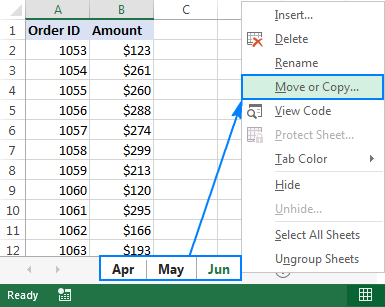
- In the Move or Copy dialog box, do the following:
- From the Move selected sheets to book drop-down list, select the target workbook into which you want to merge other files.
- Specify where exactly the copied sheet tabs should be inserted. In our case, we choose the move to end option.
- Select the Create a copy box if you want the original worksheets to remain in the source file.
- Click OK to finish the merge process.

The screenshot below shows the result - sheets from two Excel files combined into one. To merge tabs from other Excel files, repeat the above steps for each workbook individually.
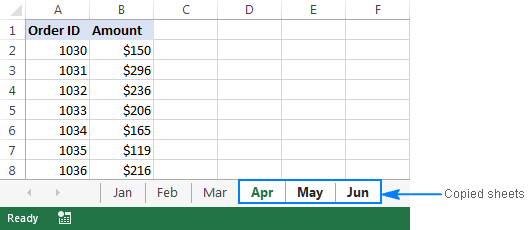
When coping sheets manually, please be aware of the following limitation imposed by Excel: it is not possible to move or copy a group of sheets if any of those sheets contains a table. In this case, you will have to either convert a table to a range or use one of the following methods that do not have this limitation.
How to merge Excel files with VBA
If you have multiple Excel files that have to merged into one file, a faster way would be to automate the process with a VBA macro.
Below you will find the VBA code that copies all sheets from all Excel files that you select into one workbook. This MergeExcelFiles macro is written by Alex, one of our best Excel gurus.
Important note! The macro works with the following caveat - the files to be merged should not be open physically or in memory. In such a case, you will get a run-time error.
How to add this macro to your workbook
If you'd like to insert the macro in your own workbook, perform these usual steps:
- Press Alt + F11 to open the Visual Basic Editor.
- Right-click ThisWorkbook on the left pane and select Insert > Module from the context menu.
- In the window that appears (Code window), paste the above code.
For the detailed step-by-step instructions, please see How to insert and run VBA code in Excel.
Alternatively, you can download the macro in an Excel file, open it alongside your target workbook (enable macro if prompted), then switch to your own workbook and press Alt + F8 to run the macro. If you are new to using macros in Excel, please follow the detailed steps below.
How to use the MergeExcelFiles macro
Open the Excel file where you want to merge sheets from other workbooks and do the following:
- Press Alt + F8 to open the Macro dialog.
- Under Macro name, select MergeExcelFiles and click Run.

- The standard explorer window will open, you select one or more workbooks you want to combine, and click Open. To select multiple files, hold down the Ctrl key while clicking the file names.
Depending on how many files you've selected, allow the macro a few seconds or minutes to process them. After the macro completes, it will notify you how many files have been processed and how many sheets have been merged:
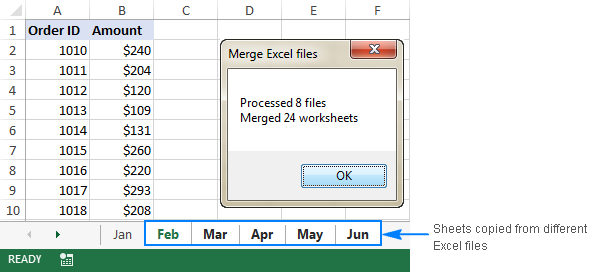
Combine multiple Excel files into one with Ultimate Suite
If you are not very comfortable with VBA and looking for an easier and faster way to merge Excel files, have a look at the Copy Sheets tool, one of 70+ time saving features included with our Ultimate Suite for Excel.
With the Ultimate Suite, merging multiple Excel workbooks into one is as easy as one-two-three (literally, only 3 quick steps). You don't even have to open all of the workbooks you want to combine.
- With the master workbook open, go to the Ablebits Data tab > Merge group, and click Copy Sheets > Selected Sheets to one Workbook.
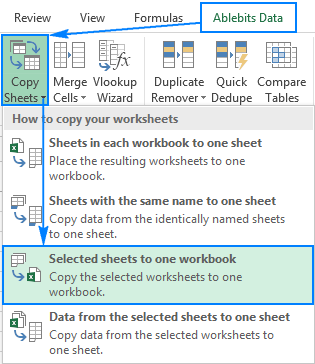
- In the Copy Worksheets dialog window, select the files (and optionally worksheets) you want to merge and click Next.

Tips:
- To select all sheets in a certain workbook, just put a tick in the box next to the workbook name, all the sheets within that Excel file will be selected automatically.
- To merge sheets from closed workbooks, click the Add files… button and select as many workbooks as you want. This will add the selected files only to the Copy Worksheets window without opening them in Excel.
- To copy only a specific area in a certain workbook, hover over the sheet name with your mouse, then click the Collapse Dialog icon
 and select the desired range. By default, all data is copied.
and select the desired range. By default, all data is copied.
- Select one or more additional options, if needed, and click Copy. The screenshot below shows the default settings: Paste all (formulas and values) and Preserve formatting.

Allow the Copy Worksheets wizard a few seconds for processing and enjoy the result!
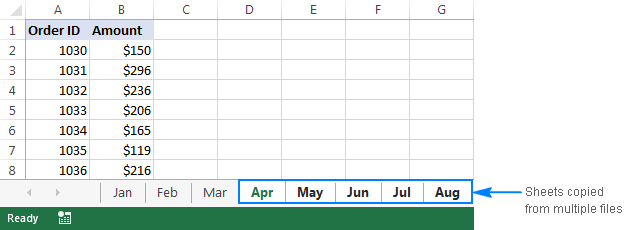
To have a closer look at this and other merge tools for Excel, you are welcome to download an evaluation version of Ultimate Suite.
Other ways to merge Excel sheets and combine data
The above examples have demonstrated the best techniques to merge multiple Excel files into one. For more ways to combine sheets in Excel, please check out the following resources.
Available downloads
Macro to merge multiple Excel files (.xlsm file)
Ultimate Suite 14-day fully-functional version (.exe file)
 by
by
249 comments
Thank you - huge time saver!!
VBA worked great! Thanks!
Macro worked perfect! Thank you!!
that is genius! thanks for creating and sharing this tool. Macro works in seconds.
Hi! This is very useful. God bless you! I have trouble making the command line: "copy *.xls merged.xls" or "concat *.xls merged.xls" work in Command Prompt or Terminal and I am very grateful to have found this as it is the easiest code in the internet - I don't need to change the code just to input the directory of the files to be merged or the input the desired filename, so for that, thank you! I just shared this with my co-workers who have never used VBA before.
By any chance, can you write up a code which will merge multiple workbooks into one worksheet instead of one workbook with multiple sheets? I know how to use Power Query but sometimes it leaves out some sheets after the merging and it usually causes Excel to stop working as I am merging several files with average 6,000 to 10,000 rows.
Also, do you know what other command line I could use on Command Prompt or Terminal other than the "copy" or "concat"?? Would really appreciate it.
Hi! We do not do VBA code creation or customization on request. However, you can try to solve your problem using the Combine Sheets tool. Merge data from multiple worksheets into a single Excel sheet based on column headings. It is available as a part of our Ultimate Suite for Excel that you can install in a trial mode and check how it works for free.
Thanks
Hello,
I am getting the following error every time I run this macro:
when I run it I get the following error:
Run-time error '1004':
Method 'GetOpenFileName' of object '_Application' failed
Anyone else gotten this or know how to troubleshoot? thanks
Hello Arman!
Unfortunately, I can't see how you inserted the VBA code into your file and how you select the workbooks to merge them. Try using sample file linked at the end of this article.
Hi Alexander,
I'm facing the same issue as Arman. I get this error immediately when clicking on 'Run' i.e. I don't even get the chance to choose the workbooks.
Run-time error '1004':
Method 'GetOpenFileName' of object '_Application' failed
When I click on debug, this seems to be the line that is causing the issue (it is highlighted in yellow)
fnameList = Application.GetOpenFilename(FileFilter:="Microsoft Excel Workbooks (*.xls;*.xlsx;*.xlsm),*.xls;*.xlsx;*.xlsm", Title:="Choose Excel files to merge", MultiSelect:=True)
Do you know how I can resolve this? Thank you!
Hello Hayley!
Try using the sample file, the link to which is at the end of the article.
Hi Alexander,
Not sure if this is relevant but I'm using a Mac - could this be the reason why it isn't working?
Warm regards,
Hayley
Hi! That is the main reason. VBA does not work on macOS.
I was editing an Excel document, and a coworker tried to open that file and got the "file in use" dialog box, and saved a copy with a different name. She made several edits and so did I, and we need to keep all of them.
Is there a way to merge the two sheets into one, keeping the changes that both users made?
Thanks for your help!
Hi! You can try using the methods for merging files that are described in the article above. You can also use these recommendations: Consolidate data in Excel and merge multiple sheets into one worksheet. However, all of these methods combine data. They do not replace some data with other data. Also, Excel has no way of knowing which data is correct and which data should be replaced with new data.
Thank you so very much. Not much of a VB guy, so the macro saved me tons of time.
:-)
kindly sir make a vba code for unique values means i have many excel file and every sheet have many sheets i want to copy all same itoms all the sheets and paste new sheet which i name master sheet but dublecate itom note copy in the new workbook and also generate a vba code to link master sheet to all sheet if i put the value in master sheet this value autimatic paste all the sheets which i have this itom
Hi! We do not do VBA code creation or customization on request.
You can find and copy unique values using the Duplicate Remover tool. The tool is included in the Ultimate Suite for Excel and can be used in a free trial to see how it works.
Hi,
I think this is a great macro! Is there any way to rename the tabs on the post-merge file so that the tab names are the original file names?
I need to merge 9 files that are ~99% identical. There is a few columns in each file that are different. Post-merge, all of the tabs are named "Sheet1(n)". It's a manual process for me to then go in and rename the tabs each time.
Hi! Sorry, we do not do VBA code creation or customization on request.
Thank you so much. This macro is a saviour!
Simple and efficient, thank you
Hi,
I would like to put multiple individually saved Excel sheets into one workbook. I would also like for the tabs to have the names of the excel sheets once the process is done.
Thank You
Hi! We have a tool that can solve your task in a couple of clicks. I recommend paying attention to the Merge Sheets tool. The tool is included in the Ultimate Suite for Excel and can be used in a free trial to see how it works.
I would like to combine excel sheets including tables. Any option for that?
Hi! If you combine worksheets, you get a single range of data. It is not very clear why you need to separate tables in this single range. To combine worksheets in a couple of clicks, check out the Combine Sheet tool. The tool is included in the Ultimate Suite for Excel and can be used in a free trial to see how it works.
Hello,
I would like to highlight when i am using these codes in Mac book air , it is showing an error in this part fnameList = Application.GetOpenFilename(FileFilter:="Microsoft Excel Workbooks (*.xls;*.xlsx;*.xlsm),*.xls;*.xlsx;*.xlsm", Title:="Choose Excel files to merge", MultiSelect:=True).
Please guide me how to fix it?
Hi! I am unable to test your problem. Try using Windows through Parallels Desktop.
Hello! This is so helpful, thank you so much!
This gets me halfway to where I want to get. I often have to go one step further and combine all tabs into one sheet, adding each tabs data to the bottom of the one ahead of it.
Are you aware of any macros or tools that can do this?
Hello! I recommend paying attention to the Combine Excel sheets tool. You can use it to combine data from multiple worksheets into a single Excel worksheet based on column headings. You can also add a blank row after each subset of data. The tool is included in the Ultimate Suite for Excel and can be used in a free trial to see how it works.
This is so helpful! Thanks!
Thanks for this! Any advice for how to do this with password-protected excel files that all have the same password?
Thanks a ton.
Hi! You cannot use VBA to modify a workbook that is password protected against changes.
Thank you very much for this info. however, I got all info in red. Any change to maintain the format using the macros technique?